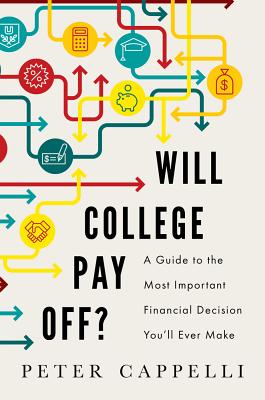 In his latest book, Dr. Peter Cappelli tackles the complex subject of Will College Pay Off? in consumer-friendly terms understandable by parents, students and policymakers. I admire his bold approach (full disclosure: he was a member of my doctoral dissertation committee) but as an active higher education participant, wonder if anyone can adequately describe and summarize all of the issues related to whether or not attending a particular college will pay off for a student.
In his latest book, Dr. Peter Cappelli tackles the complex subject of Will College Pay Off? in consumer-friendly terms understandable by parents, students and policymakers. I admire his bold approach (full disclosure: he was a member of my doctoral dissertation committee) but as an active higher education participant, wonder if anyone can adequately describe and summarize all of the issues related to whether or not attending a particular college will pay off for a student.
According to Dr. Cappelli, there are several myths that influence the average American high school student to attend college, including the following: (1) the notion that today’s K-12 students are doing worse; (2) the U.S. education system is failing compared to other countries; (3) jobs today and in the future will require more education; (4) many jobs exist for those who have the right education; and (5) there are shortages of science, technology, engineering and math (STEM) graduates. He writes that the gap between average lifetime earnings of college, versus high school, graduates has increased primarily because the earnings of those with less education have collapsed versus the assumption that the earnings of college graduates have increased.
Looking at the payoff of attending college, Cappelli notes that there is a wide variance among them, with up to 25 percent of all colleges actually providing a negative return to the student. While conceding that much of that variance may stem from the attributes of their students, he states that knowing this should give a reader pause in selecting colleges without understanding more about them. For most colleges, Cappelli reports that the average annual return on investment has been approximately 7 percent, a rate that is negated if the cost of attendance is financed.
Typically, the cost of college is portrayed as the cost of tuition, fees, and room and board. Cappelli takes a bolder approach by stating that the biggest cost of college comes when/if a student drops out and that sending someone to college when they’re not ready is a bad bet. He further suggests that the next biggest cost factor is the time to graduation. He describes the scenario where full-time students take up to six years to complete a four- year program and states that more expensive colleges offering support programs that enable students to graduate in four years may be less expensive than public institutions where students may take six years to finish. He encourages everyone to apply for financial aid since the upside can be substantial. He also suggests that students and parents consider trading down to a less selective school if it cuts the costs to attend through merit scholarships or other discounts. This is particularly important since U.S. students pay more for college than students do in any other country.
As you might expect to read from a researcher who focuses on the workforce and human resources, Cappelli states that the toughest part of the benefit of college to evaluate is employment outcomes. The availability of many jobs depends on supply and demand, something that constantly changes. He states that STEM jobs have never been consistently hot, even though the press portrays them as such. Specifically, engineering and technology jobs have been very volatile in terms of demand and “figuring out what the job prospects are like for a degree program at a particular college is tricky because often the colleges don’t know themselves.”
Cappelli writes that college should prepare graduates for a lifetime of employment and that students should consider how much a specific degree will prepare them for life after their first job. Employers are looking for graduates with better decision- making and communication skills, not job-focused knowledge and skills. Internships and on-the-job experiences are more important than coursework in some of the career-oriented degrees. Furthermore, he argues that people who suggest that everyone should go to college without resolving how they’re going to pay for it are reckless with their advice.
Many can benefit from reading, Will College Pay Off? I found Cappelli’s premise and supporting data to be thought-provoking and persuasive. Reporting earnings and career outcomes for college graduates is difficult, but he makes a good point that colleges can do more to obtain and publish more accurate and relevant data from their graduates. Since the U.S Department of Education found a way to obtain earnings data for institutions required to participate in Gainful Employment, perhaps they could also share this information for all institutions to benefit prospective students everywhere. Lastly, Cappelli writes that “overeducation is widespread” and that “the average U.S. worker has 30 percent more education than his or her job requires.” While he argues for an education that is less skills-specific, the question remains as to whether everyone should go to college. Perhaps, we can expect an answer when he publishes his next book.











